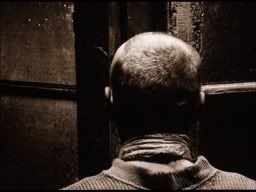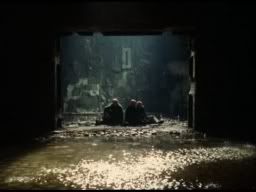Andrei Tarkovsky, Stalker

Stalker, like Tarkovsky's earlier Solyaris and later Nostalghia, is the soul's journey into alien land and its subsequent return to itself. A meteorite landed some 20 years ago in the Zone. It destroyed all human settlement and left little sound and, despite blooming flowers, no smell. It also left a room where people's innermost desires came true. A stalker, a scientist and a writer embark on a surreal pilgrimage to this room, and discover that the key to their own desires lies in the journey instead.
The searchers wade through scary-looking tunnels and approach things only circuitously, lest the path to self-discovery be straight-forward or devoid of suffering. Each follows in the others' footstep: the trailblazer wary and hesitant, the rest often following only when the trailblazer is out of sight, and the whole group adhering to seemingly arbitrary rules. After all, such is the nature of our collective self-reflection. Yet the room and the journey is the elaborate setup of a mirror to our innermost desires. Under the pressure to verbalize their desires, the searchers instead reach honest appraisals of themselves. The scientist only fears what he does not understand; the writer hints upon a revelation that his innermost desire is money; while the staker imbues others' journeys with a possibly false notion of his own deliverance. Strewn along the path are remnants of man's other failed instruments of desire: technology, religion, drugs. Fulfillment is irrelevant by the journey's end, and their time together leads the searchers to realizations far more profound than the materialization of any desire.
And most important,
let them believe in themselves
let them be helpless like children,
because weakness is a great thing,
and strength is nothing.
Truly enough, as the stalker sermonizes, while the old and hardened return fruitless from their thwarted pilgrimage, the young and the innocent are already there. In the final shot, 3 glasses that symbolize 3 archetypes of the human soul are torn apart by inexplicable forces. One eventually drops off and breaks. What did Monkey wish for? Perhaps the return of her father? Did she already possess the room's invisible powers? Stalker's unforgettable ending shot seems to suggest just that.

All that might have been,
like a five-cornered leaf
fell right into my hands,
but this isn't enough.
The whispered undercurrent in Stalker's themes of human desire and searching is a deeper, nameless nostalghia. Nostalghia is the single common element that is the lifeblood of Tarkovsky oeuvre, and what is only hinted at here unfolds in dreamlike grandeur in his later Nostalghia. Nostalghia, arguably Tarkovsky's most refined spiritual masterpiece, effectively provides the closure to the soul's unnameable longing in its ending scene that never materializes for our searchers.
The shots in Stalker are endless, and endlessly beautiful. The imperceptible glide of the camera, strange shifts in sunlight, muted sepia and drained greens are trademark Tarkovsky, and provide the degree of unreality suited to the apocalyptic setting of the story. Every frame is perfect, and the film is worth watching if only to marvel at the excruciating detail involved in particularly the long shots.
Interpretations of this film obviously vary. Although the dialogue in Stalker often feels like Tarkovsky conversing with himself, I have never been as inspired to trace the threads swirling around the central theme of a film. One of the joys of watching an art film remains not having everything served on a plate. And, just like the room in the Zone, Stalker gives away only as much as the viewer's own light will reveal.


0 Comments:
Post a Comment
<< Home